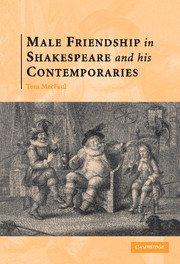Book contents
- Frontmatter
- Contents
- Acknowledgements
- Note on the text and list of abbreviations
- 1 True friends?
- 2 Momentary mutuality in Shakespeare's Sonnets
- 3 Friends and brothers
- 4 Love and friendship
- 5 Servants
- 6 Political friendship
- 7 Fellowship
- 8 False friendship and betrayal
- 9 Conclusion: ‘Time must friend or end’
- Notes
- Bibliography
- Index
5 - Servants
Published online by Cambridge University Press: 22 September 2009
- Frontmatter
- Contents
- Acknowledgements
- Note on the text and list of abbreviations
- 1 True friends?
- 2 Momentary mutuality in Shakespeare's Sonnets
- 3 Friends and brothers
- 4 Love and friendship
- 5 Servants
- 6 Political friendship
- 7 Fellowship
- 8 False friendship and betrayal
- 9 Conclusion: ‘Time must friend or end’
- Notes
- Bibliography
- Index
Summary
The idealizing Humanist tradition, with its insistence on equality between friends, cannot regard the relationship between masters and servants as friendship, but service necessarily provides a form of intimacy that is at least as great as friendship. Service is of course very similar to instrumental friendship, the imperfect friendship accepted by Aristotle but condemned by Cicero. The Humanist insistence on equal friendship is precisely an attempt to do away with a model of friendship as involving service. At the top of the social hierarchy, semi-feudal service persisted, particularly in aristocratic bodily attendance on the monarch, which was an honour and gave evidence of royal ‘countenance’. This sense of service as providing friendly access to and intimacy with the powerful still extended down the social ladder, but the nature of the bonds between masters and servants was deeply problematic in the early modern period. The old assumption that a gentleman's or an aristocrat's servants were of roughly similar status to their master no longer held. Consequently, it was increasingly hard to regard servants as part of the family. What had until recently been a semi-feudal, familial arrangement was transforming into a more financial and temporary arrangement, to the affective detriment of both masters and servants. Thomas Moisan notes that service was a troublesome category in Renaissance England: ‘the social identity of the servingman in particular seems often to have eluded neat taxonomies and to have been assessed in patriarchalist terms as an extension of the master or house served’.
- Type
- Chapter
- Information
- Male Friendship in Shakespeare and his Contemporaries , pp. 91 - 115Publisher: Cambridge University PressPrint publication year: 2007



